We’ve made it this far: Taking a wider look at where US Soccer stands with Alexi Lalas
We’ve made it this far: Taking a wider look at where US Soccer stands with Alexi Lalas


By Kevin Koczwara, writing from Boston
Bukowski’s Tavern in Boston is joined at the hip with a parking garage, has a few bar seats and sits no more than 10 tables – I’m being generous – and hides from any sort of attention by being inconveniently located on a side street. Close by is Newbury Street, Boston’s high-end shopping street, but the dark tavern drifts nowhere near the over-hyped and priced boutique atmosphere. And this is where I sit, drinking a beer and scouring down a hamburger, waiting for Alexi Lalas to arrive from The Hynes Convention Center across the street.
Both of us have come to city today, March 2nd, 2012, to attend the MIT Sloan Sports Analytics conference. Lalas is a panel member for the Soccer Analytics talk and I’m here to report to see if I can find some sort of story to tell at this two-day networking festival for the best and brightest minds in sports. Neither of us really belong. I know one or two people here, and that’s because either I cover the team of which they’re the president or because I’ve sat next to them in a press box in the past – and Lalas is kind of an outsider in this world; he’s not traditionally a corporate thinker. He’s a former professional with plenty of insight and knowledge, but he doesn’t toe the line and say what people expect.
Lalas is one of the many ESPN representatives here – ESPN has a major role to play in the growth and success of this conference – but he stands out because he appears to be someone who is here to speak and learn and doesn’t seem interested in networking or sucking up to anyone. When we meet at Bukowski’s he looks like the Alexi Lalas I know from the television set and the 1994 U.S. Men’s National Team – save the facial hair and long locks – but he’s different, softer when not risking life and limb to block one shot after another. Instead, he looks relaxed and genuinely excited. His hair is a bit disheveled instead of neatly placed for the cameras, though tomorrow he’ll take the stage as a panelist. He’ll wear combat boots with his suit, but for the moment it’s time to enjoy some beer and talk America’s growing obsession: soccer.
I got to Bukowski’s early, grabbed a table and ordered a beer and burger. This is the antithesis of a sports bar; it isn’t looking for fans. Lalas sits down and we go through the formalities before jumping into our conversation after a round of beers arrive.
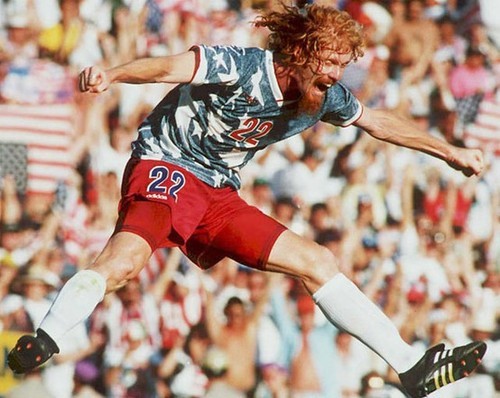
Kevin Koczwara: Let’s start off with a story about the 1994 World Cup team that people might not know.
Alexi Lalas: It was a crazy team. When I look back at the characters and individuals that Bora [Milutinovic] assembled, he was an incredible man-manager because there were very few shrinking violets and he – I think from a real early point in his involvement – recognized he needed some personality and character and he wanted that, to his credit because there are plenty of coaches that don’t want that. He was my champion through the World Cup, even when people were telling him you can’t go to a World Cup and start me, so I will always be loyal to him. I can take my own personal experience out and look at some of the things that he did. He was always testing you.
We were all pretty young and inexperienced, even the guys that were playing pro were very inexperienced, and forcing us to test ourselves and think of ourselves on and off the field in a completely different way, and tests were different for different people. When I first got to the national team camp before the World Cup and started residency we didn’t know if we were going to be involved two years later. In this process, along the way people went. There was collateral damage.
I had real long hair at the time, and I came into training one day and Bora’s assistant called me into a room and said, “Bora wants me to tell you something,” I said, “what?” “You need to get a haircut.” And I lost it. “What the the f—, I can’t believe this. This is ridiculous. This is America.” I went into an incredible diatribe on what it means to be an individual, we’re the sum of all our parts, curtailing individual expression and that kind of stuff. Inevitably, what it came down to was I would do anything to be on that team and I walked into a barbershop in Phoenix, Ariz. and came out with short hair. Bora never said anything to me. I walked into the team meeting after my haircut and he nodded to me and said, “You look very nice.” And he never, for the next two years, said a single word about my hair. And I grew it right back down as far as I could and started that thing on the face.
I always think back to that because it’s a simple bullsh*t type of story, but it really shows how Bora tests. It wasn’t the last test by any stretch of the imagination, but that was a specific test to me. For another guy it might have been something else and there were plenty of tests further on, but I passed that test because he knew, as stupid as it may sound, how important having long hair was to me at the time and even looking back on it as “that’s kind of stupid.” But he knew it was going to be a test and in his eyes that’s how he was going to test me and I passed it, which is kind of funny because we were just playing regular games and he knew the World Cup was going to come at some point and, yet, he never said another thing about my hair even when I walked out onto the field in front of a billion people with this crazy hair. He appreciated it and loved it.
So, it really had nothing to do with the hair. It had much more to do with these tests that he was constantly using to evaluate the players he had. Because he could see kicking the ball-wise what he had, but the other part he knew was going to come into play. That was a really long story. I apologize.
KK: That’s interesting because you’re remembered for your hair.
AL: Ironically that’s what people remember me by.
KK: Not at all the playing, just the hair.
AL: I know. It’s alright. [Laughs].
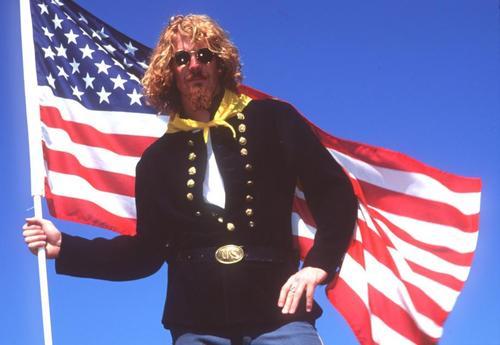
KK: And then MLS starts, so what were you thinking when the U.S. decides to start another professional league and calls you up and asks you to play while you’re over in Italy in Serie A?
AL: It’s weird. I think – and this is a trait and characteristic that was also part of that generation – we were always constantly told we were doing something new here, and we were, it was wild west on and off the field. And pioneers and different phrases, they all applied. We didn’t know what the hell we were doing, wing it. But there was something that comes out of that, a sense of responsibility and ultimately a sense of pride that this was our thing. And so we would talk in the back of buses and bars and hotel rooms about, ‘wouldn’t it be great at some point to make a living doing this sport that we love in our own country?’ because it didn’t really exist. It was the wilderness back then in terms of professional soccer. It was after the NASL, and they had the San Francisco Blackhawks and that type of environment and you weren’t really making a lot of money.
So I went off to Serie A and had this incredible adventure, and yet I’d be lying to you if I told you in the back of my mind MLS wasn’t there the entire time. That’s a personal thing because I know other guys wanted nothing to do with it and I don’t begrudge them. They made their decisions. But I knew I wanted to be part of it from the start even with the risk involved and maybe at the detriment of my own career, but it was important to me. I’ll tell you right now one of the proudest days of my life was the day we kicked off in 1996 and the Revs [New England Revolution] were down in Tampa – it was our first game ever. That whistle blew that first minute, I couldn’t even function as a player or a person because I was so proud to be playing a professional game. I am proud of doing that and having that moment and having that attitude and I’m not the only one.
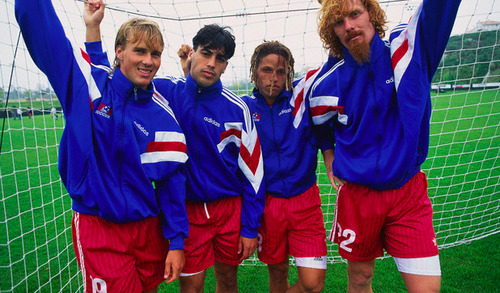
KK: It’s been sixteen years since then and MLS has made major strides, but what next for the league, what does it need to do?
AL: I think we constantly kick ourselves in the ass for what we haven’t done and what we need to do. And I think that’s just kind of American human nature: we always want to do better and strive for the next thing. We’re not pessimists, but that’s just in our DNA. But I also think there’s a time to look back and pat ourselves on the back.
Let’s take it since 1994 because that’s really the start of MLS. What, in 16, 17, 18 years now what we have done on the field, and I say ‘we’ because we are all part of this, is pretty unprecedented in terms of the growth of a professional league. When you put it up against other sports in our country and other sports around the world, the fact that we have 19 teams, the fact that we have continued expansion, the fact that we have moments like signing David Beckham, the fact that we have soccer specific stadiums coming online, the fact that we have this diverse type of ownership with very deep pockets that don’t just look at soccer out of the goodness of their heart but actually look at it as a business, we can be pretty proud of that. Now, we don’t waste too much time patting ourselves on the back because we have a long way to go and a whole lot of stuff to do.
I think number one right now, and it is going to require patience and time, it’s just the reality of it, is that we have a credibility problem in terms of how we are viewed from the outside by players and supporters and fans around the world, and by the general public. It’s starting to change. It’s a perception vs. reality problem is what it is.
I will argue to the day I die that the level of the MLS is much higher than people give it credit for. I will also argue that while we can debate whether it is the most entertaining league – and I won’t debate that it is the most entertaining league – but I will argue that it is the most competitive league in the world because of its structure, because it’s single entity and because of the manufactured parity. We don’t have the situation where we have the haves and the have nots like the way it exists everywhere else in the world. And that’s something unique. When an MLS coach has success I think you need to put him up on a pedestal because he didn’t walk into his job and say, “How much money do I have to spend?”
And that’s the first question now that managers around the world ask and then everything is relative to that, “Well, then we’re going to finish here,” “We’re going to finish here”. An MLS coach, this is what you have to spend, and yeah there are fluctuations here and there, but it’s not even close to what it is around the world. So when he actually has success in this structure that’s an incredible feat.
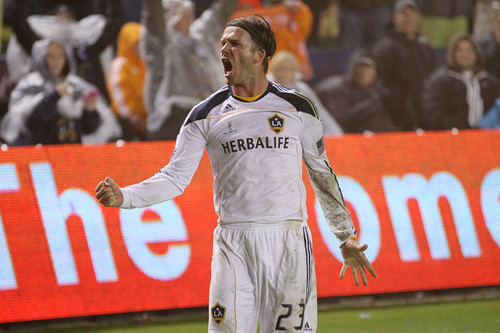
I know I’m talking a lot, but this is the type of stuff that needs to be out there to gain credibility, and the only way to gain credibility is doing well in international tournaments, so CONCACAF Champions League. When Real Salt Lake lost that last year that was brutal, not just for them but for the league because for the first time we could have had an MLS team in the Club World Cup. That’s huge. That’s a huge statement and message to send around the world, so we need to continue to do that and I hope another MLS team gets to the final, if it would be the Galaxy – take away my Galaxy affiliation – I think any businessman would think to have the Galaxy and David Beckham in the Club World Cup that would be a wonderful, wonderful moment for the league, not just for the Galaxy. We’ll see. We’ll see what happens. There is still work to do.
KK: You weren’t impressed with Klinsmann and I wasn’t either for the win in Italy.
AL: I took a lot of heat for that.
KK: Because people were looking at it like, ‘They beat Italy.’ My question would be then part of the problem is the talent pool he has and how do we fix that? How did you come through the talent pool in your day?
AL: I’m a product of youth soccer in terms of orange peels and juice boxes at half time. I had a slight advantage in that my father is Greek and I grew up going back and forth at a very early age to Athens, Greece from Detroit, Michigan. So I started playing in literally the dirt in Athens as the American kid running to the corner and getting in pick-up games early on, so I had that pick-up experience early on, that organic, authentic experience that we talk about and doesn’t unfortunately doesn’t exist in the United States. Then I came back to Detroit and even while very young I started in all those youth clubs and all those kinds of stuff. So I do have a traditional background. I did some ODP on the State team and that kind of stuff, and then I didn’t have any college opportunities.
My father at one point called up Rutgers and said, “Look, this kid has done this, this, this and these are his SAT Scores, can you take a look at him?” And we drove out the 16 hours the next day and the coach said, “We’re going through a rebuilding year next year, I can invite you to the preseason and I can get you into the agriculture school.“ I got rejected everywhere I applied so that was good enough for me. I had never been to Rutgers let a lone New Jersey.
So I did everything wrong in terms of picking a school, but I went to a Division 1 college and that got me noticed on a national scale, which led to the Olympic team in 1992 in Barcelona and then on and on and on. That’s how I did it. With regards to what we’re doing now, there are so many opportunities. The other day the Under-23’s put a walloping on Mexico 3-0, the same day we beat Italy. So, I think that there is some talent coming up but when we’re looking at Jurgen Klinsmann’s job, which is to coach this national team and get it to do something better than it has in the past and grab those moments, that’s what I’m assessing.
I’ve said before I’m not here to be a cheerleader. I’m here to provide context and perspective for the viewer when I’m talking about this team. It’s not that it wasn’t a historical result and it’s not that it shouldn’t be celebrated. But, once again don’t tell me it’s something new because it’s not something new and that’s okay, and as I’ve said before maybe that’s a good thing for Jurgen Klinsmann to see – a dose of reality to say, ’maybe you want to do this, but you only have the tools to do this.’ And it doesn’t mean it’s not improving the team, but that’s not where we are. So when you come in and promise for seven months that this is what we’re going to do and then you go out in a completely different way and in a style that’s actually what we’ve been doing all along, then I’m not going to sit there and say that’s great.
KK: What happens to the young and promising players that the U.S. produces when they go off to Europe? They all seem to fade off.
AL: That’s not a unique phenomenon for the U.S. You talk about the African nations, for years and years and years we talked about how great they’ve been at the youth level and yet that hasn’t translated onto the international scene. Because really when you’re talking about a youth tournament or a youth national team you’re still only really talking about two or three guys that ultimately will go. Yes, you have those blips and aberrations when you’ll have, and we’ll always call it, a ‘Golden Generation’, whether it’s a Portugal or Spain. But I think when you’re involving five guys or more that are coming through then I think it qualifies as a “Golden Something or other”, whatever we’re going to call it. We’re not necessarily at that point where we have that, and a lot of it is luck and timing and maybe it’ll happen. I don’t know.
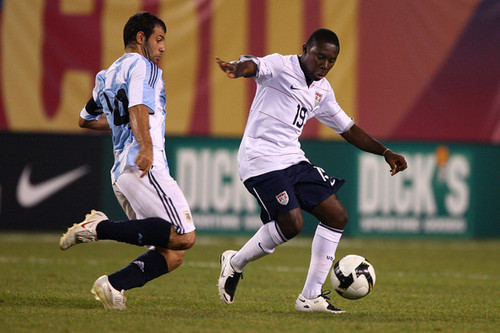
KK: One of the things is people say we don’t have that organic talent, those pick-up guys. I would argue there are a lot of those guys around, we just don’t find them.
AL: You would argue there is that whole falling through the cracks situation?
KK: One of my friends runs a non-profit in Boston and part of his deal is teaching coaches how to coach with inner-city kids and giving those kids a chance. His whole thing is there is talent there you just need to find it. A lot of those kids can’t play in a league because they need to go work, or they can’t play in a league because they’re parents can’t afford it.
AL: That’s why some of these academies that MLS teams are creating are important because you don’t pay, but you have to be able to find those players and give them that opportunity. Then the other part is the style they may play may not fit the style of that particular club or the national team or something like that. So, you almost have to completely change the way you play from an early age and bring that entire group playing a different way and that’s a hard proposition. When a lot of youth soccer is dependent on winning and that’s how they make money and that kind of stuff, and that’s where Jurgen deserves a lot of credit.
I talk to Jurgen, he’s a friend of mine, everything I say I make sure I can say it to his face and I could. If Jurgen was sitting here I’d say, “Jurgen, for seven months you promised us something new and that was not something new.” And he’d argue, “this was new.” And we’d argue and fine. But, to his credit, he’s talked about fundamentally changing the way people start at a young age and I think he’s really content that some of the changes that he’s making in the entire system might not reflect in the full national team are going to take a while to come to fruition and he might not even be around to see that and he’s OK with that.
KK: Like Germany.
AL: Exactly. He’ll be the first person to tell you that some of the changes he did are just now coming to fruition.
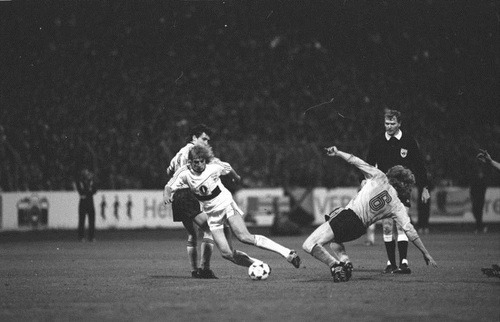
KK: Playing soccer in the backyard is a real novel idea…
AL: Yeah, I know. It’s also cultural. When we were growing up, I don’t know you’re younger, when I grew up and it was probably more my generation and I was one of the last generations, we would get kicked out of the house and come back at five o’clock and just wander around and do whatever and that fosters a lot of that pick-up kind of stuff. Now, it’s playdates, and I have to know where you are and tracking devices and text me where you are, and that’s not really conducive to what happens in a lot of places around the world.
KK: My parents allowed that to an extent and it was weird. I didn’t go to daycamp in the summer.
AL: And look, I’m a dad now so I understand especially when there is that whole concept of somebody could kidnap your child and abduct your child, and I mean that freaks parents out and I get it. I understand it. But when you’re talking about stick ball and anything like that, it was a different time.
KK: Back to Klinsy, what’s the biggest problem he has right now with this team?
AL: I think it was on display the other day. The natural and internal desire to change and he’s going to wrestle with that because I believe he still wants to do it and that’s not necessarily a bad thing, but once again he is going to come up against the realities of the situation and then he’s going to come up against real games that mean something. And look, if we can’t qualify for the World Cup then something is really a problem. I don’t think that should be a problem. It’s not that we’re going to waltz through and kill everybody, but we should qualify.
We should beat those team. They’re all good teams; we are all still better. His job is not to get us over those teams. His job is when the game against Ghana comes in a World Cup…
KK: It’s not to start Ricardo Clark.
AL: It’s something that he says, or…
KK: Keep Ricardo Clark off the field.
AL: Or keep Ricardo Clark off the field… Well, anyway, that’s what he’s up against. I think he will improve the team, but I think it will still have the same characteristics that have ultimately given us success. And like I’ve said, I don’t think that is a bad thing. And his constant need to find this American style, it’s there. You have to pull it out and refine it. And then maybe he can do his most good with establishing things from a younger age that will then establish us the type of quality he needs in order to really fundamentally change the we play.
———————————————————
We finished two beers and then decided to head back over to the conference across the street for the bar part of the night. I stuck around for my one complimentary drink and headed out while Lalas was slowly swarmed by soccer fans. The room was packed and all I could think about was how no matter how amazing the presentations would be, none of the hype would be as engaging as an organic discussion that could flourish alongside a handful of shared passion and a couple of decent beers.
Kevin Koczwara is a journalist from Central Massachusetts. He writes for New England Soccer Today, helps edit LFC Boston’s blog: The Red Letter, and was one of the co-founders of the now defunct The Soccer Guys. He really wishes parking was cheaper at the Hynes Convention Center in Boston. Comments below please.







